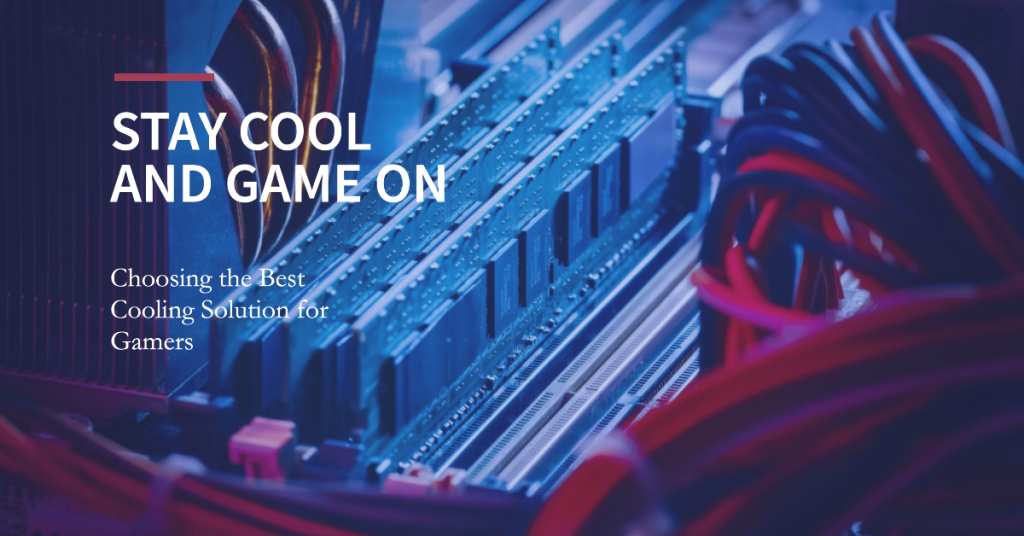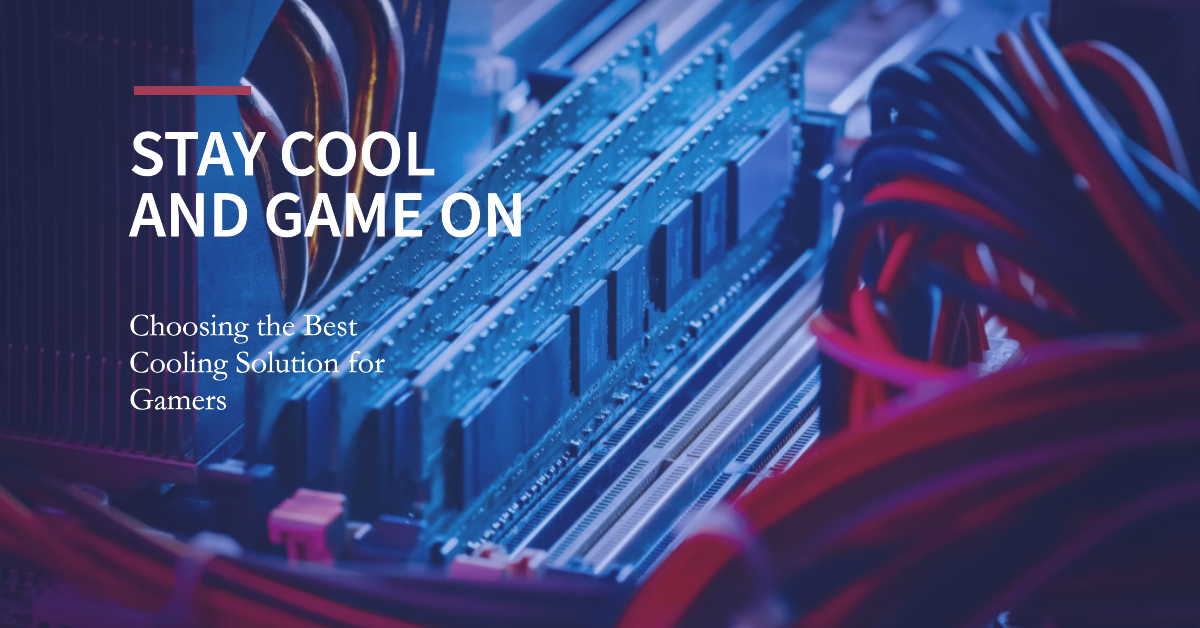Right Cooling Solution for Your Gaming PC
Right Cooling Solution for Your Gaming PC- In the realm of gaming, the importance of cooling systems cannot be understated. As gamers push their hardware to the limits, temperatures play a pivotal role in ensuring optimal gaming performance. Understanding the impact of temperature on gaming and exploring various cooling solutions becomes imperative for gamers seeking a seamless gaming experience.
Exploring the importance of cooling systems for gamers
Gaming has evolved from a casual pastime to a demanding activity that requires powerful hardware. Modern games demand substantial computational power, which generates a significant amount of heat.
Without a robust cooling system, this heat can negatively affect the performance of crucial components, leading to reduced frame rates, lag, and even system crashes. To prevent such issues, gamers turn to cooling solutions that efficiently dissipate heat and maintain optimal performance.
How temperature affects gaming performance
Temperature plays a vital role in determining the performance and longevity of gaming hardware. High temperatures can cause thermal throttling, a phenomenon where the components of a gaming system automatically reduce their performance to prevent overheating.
This throttling not only limits the hardware’s capabilities but also hampers the overall gaming experience. By implementing effective cooling solutions, gamers can mitigate these risks and ensure consistent performance even during demanding gaming sessions.

Air Cooling: Basics and Benefits
Understanding air cooling
Air cooling serves as a popular and straightforward cooling mechanism widely utilized in gaming setups. It involves the use of fans and heatsinks to dissipate heat generated by the system’s components. A combination of case fans, CPU coolers, and GPU coolers work in unison to regulate temperatures.
Components involved in an air-cooled system
Case Fans: These fans intake cool air and exhaust hot air from the gaming system.
- Front and rear fans facilitate proper airflow within the case.
- Top fans can be additional ventilation points to remove rising hot air.
CPU Coolers: These coolers are responsible for dissipating heat generated by the CPU.
- Air coolers consist of heatsinks and fans that pull or push air over the CPU.
GPU Coolers: Graphics Processing Units (GPUs) possess integrated coolers to handle thermal loads.
- Standard coolers comprise heatsinks and fans, similar to CPU coolers.
Advantages of air cooling
Air cooling presents numerous benefits that make it an attractive choice for many gamers.
- Cost-effective solution for cooling gaming setups
- Fans and heatsinks are generally more affordable compared to liquid cooling systems.
- Easy installation and maintenance
- Air cooling components can be readily installed without professional assistance.
- Maintenance involves cleaning dust from fans and heatsinks periodically.
- Reliable performance under normal gaming conditions
- Air cooling efficiently manages temperatures during everyday gaming sessions.
Limitations of air cooling
Despite its advantages, air cooling has a few limitations that gamers should consider.
- Inadequate cooling in high-demand gaming scenarios
- Air cooling may struggle to cope with extreme heat produced during resource-intensive gaming, resulting in potential performance degradation.
- Potential for increased noise levels
- Due to multiple fans running simultaneously, air cooling systems can generate noticeable noise, impacting the overall gaming experience.
- Limited overclocking capabilities
- Overclocking, a practice of increasing the clock speeds of hardware for improved performance, can be constrained by the limitations of air cooling systems.
Liquid Cooling: Basics and Benefits
Understanding liquid cooling
Liquid cooling introduces a more advanced mechanism to dissipate heat from gaming systems. It involves the use of liquid coolant, typically water or a specialized liquid, which absorbs and transports heat away from the components. The heat is then expelled through radiators equipped with fans.
Advantages of liquid cooling
Liquid cooling offers several benefits that cater to the needs of enthusiastic gamers.
- Efficient heat dissipation for intense gaming sessions
- Liquid coolant has a higher heat capacity than air, enabling it to absorb and dissipate heat more effectively, especially during prolonged gaming sessions.
- Low noise levels and improved aesthetics
- Liquid cooling systems tend to generate less noise compared to air cooling systems.
- Additionally, the absence of bulky heatsinks contributes to a visually appealing and clean-looking gaming setup.
- Enhanced overclocking potential
- Due to its superior cooling capabilities, liquid cooling allows for better heat dissipation, increasing the potential for overclocking and achieving higher performance levels.
Limitations of liquid cooling
Though liquid cooling possesses numerous advantages, it is important to consider the potential drawbacks.
- Higher initial cost compared to air cooling
- Liquid cooling systems, with their more intricate components, tend to have a higher price point than air cooling setups.
- Complex installation and maintenance process
- Proper installation of liquid cooling systems may require technical expertise to ensure optimal performance and prevent leaks.
- Regular maintenance, such as coolant refills and cleaning, is necessary to avoid any potential issues.
- Potential risks of leaks and component damage
- Liquid cooling systems carry a slight risk of leaks, which can damage other components if not detected and resolved promptly.
- Care must be taken during installation and maintenance to minimize this risk.
Factors to Consider When Choosing
Selecting the appropriate cooling solution is crucial for gamers. Several crucial factors should be considered during the decision-making process.
Gaming requirements and goals
To determine the ideal cooling solution, gamers should account for their specific gaming preferences and requirements.
- Determining the cooling needs based on gaming preferences
- Gamers who engage in resource-intensive games may require more robust cooling solutions.
- Casual gamers, on the other hand, might opt for more cost-effective options.
- Analysing the gaming hardware specifications
- Understanding the thermal characteristics and requirements of hardware components aids in making an informed decision.
- High-end processors and graphics cards may benefit from more advanced cooling solutions.
Budget and cost considerations
Budgetary constraints play a vital role in choosing between air and liquid cooling systems.
- Factoring in the initial investment and long-term costs
- Liquid cooling systems commonly have a higher upfront cost due to their complexity.
- It is essential to consider the long-term cost implications, including maintenance and potential component replacements.
- Weighing the benefits against the financial resources available
- Balancing the cooling requirements with the available budget ensures an optimal solution that meets both needs.
Cooling system compatibility
Compatibility is essential to ensure the cooling system integrates seamlessly with the existing setup.
- Evaluating compatibility with the existing setup and hardware
- Determine if the gaming case and components can accommodate the chosen cooling system.
- Verify if the CPU and GPU are compatible with specific cooling solutions.
- Ensuring sufficient space for installation
- Ensure that the gaming case has adequate space to house the selected cooling solution.
- Proper airflow and clearance prevent overheating and potential performance issues.
Air Cooling vs. Liquid Cooling: Performance Comparison
Understanding the performance of air and liquid cooling systems in various gaming scenarios aids in making an informed decision.
Temperature management in air cooling
Analyzing the effectiveness of air cooling in reducing temperatures reveals the following insights.
- Factors that may impact cooling performance
- A number of case fans and their placement affect the overall airflow and heat dissipation.
- The quality and design of CPU and GPU coolers significantly influence cooling efficiency.
Temperature management in liquid cooling
Evaluating the efficiency of liquid cooling systems in heat dissipation reveals the following insights.
- Factors that may influence liquid cooling performance
- The capacity and flow rate of the pump influences the ability to transfer heat effectively.
- The design and surface area of water blocks play a crucial role in heat absorption.
Comparing performance in different gaming scenarios
Assessing the cooling performance during casual gaming and resource-intensive gaming highlights the following distinctions.
- Cooling during casual gaming
- Both air and liquid cooling systems can adequately manage temperatures during casual gaming sessions, ensuring smooth gameplay without excessive heat buildup.
- Cooling during resource-intensive gaming
- Resource-intensive gaming sessions generate significantly more heat, often pushing air cooling systems to their limits.
- Liquid cooling systems can handle this increased thermal load more effectively, preventing thermal throttling and maintaining high-performance levels.
The Future of Gaming Cooling Solutions
The gaming industry continues to evolve at a rapid pace, propelling advancements in cooling solutions.
Upcoming trends and technological advancements
- Innovative cooling solutions leveraging new materials and designs are being developed to enhance cooling efficiency.
- Integration of artificial intelligence and machine learning algorithms may optimize cooling management based on real-time hardware demands.
Predictions for cooling solutions tailored to gaming needs
- Future cooling solutions will aim to strike a balance between performance, cost, and ease of installation.
- Modular cooling systems and customizable solutions are expected to cater to individual gaming preferences.
Summary and Conclusion
Cooling solutions play a role, in maintaining gaming performance. When it comes to deciding between air cooling and liquid cooling gamers need to take into account factors including gaming needs, budget constraints, and compatibility.
While air cooling is an easier, install option liquid cooling stands out in terms of heat dissipation overclocking capabilities and quieter performance. The ongoing advancements, in cooling technologies, bring gamers a future with cutting-edge solutions designed specifically for their gaming requirements.


